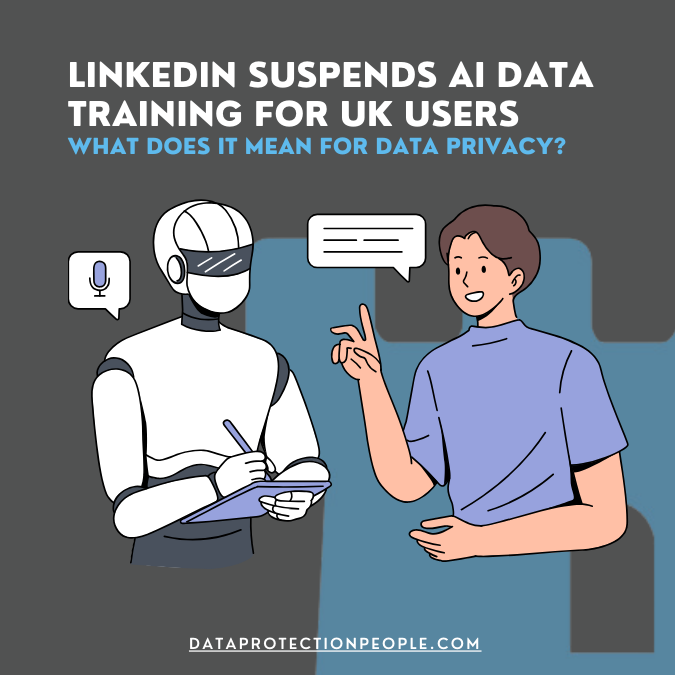LinkedIn Suspends AI Data Training for UK Users
Data Protection People News
Written by Data Protection People
LinkedIn has temporarily paused using UK user data to train its AI models after concerns raised by the ICO. Our latest article explores this decision, its implications for data privacy, and what it means for users and organisations. Want to know more? Read on or tune into this week’s Data Protection Made Easy podcast for an in-depth discussion.

LinkedIn Suspends AI Data Training for UK Users: What Does It Mean for Data Privacy?
In a significant move, LinkedIn, the career-focused social media platform, has temporarily stopped using UK user data to train its generative AI models. This decision comes after the Information Commissioner’s Office (ICO) expressed concerns regarding the privacy implications for individuals in the UK. As AI continues to evolve, the use of personal data for training these tools has become a hot topic, particularly in regions with stricter privacy regulations like the UK and the European Union.
Why Was LinkedIn Training AI Models with User Data?
LinkedIn, owned by Microsoft, like many tech giants, has been exploring the potential of generative AI. These AI tools, such as chatbots and content generation models, require vast amounts of data to improve their functionality. On platforms like LinkedIn, where users share career-related content and personal information, this data offers valuable insights for training AI tools. This technology could help users write better posts, craft messages to recruiters, and even generate resumes. However, it’s essential to consider the privacy implications of using personal data in this way.
The ICO’s Intervention: Safeguarding UK User Data
The ICO’s involvement stems from the potential privacy risks posed by LinkedIn’s AI training practices. Although LinkedIn had quietly opted users into these processes globally, the ICO raised concerns about the transparency of this approach and the rights of UK users under data protection laws like the General Data Protection Regulation (GDPR). After engagement with the ICO, LinkedIn agreed to suspend the practice and enter into further discussions with the regulator.
Stephen Almond, Executive Director for Regulatory Risk at the ICO, praised LinkedIn’s decision to pause AI training and reiterated the importance of maintaining public trust. Ensuring that individuals’ data is handled lawfully and transparently is vital, especially in the context of rapidly developing technologies like AI.
Opting Out: What It Means for Users and Organisations
In response to the ICO’s concerns, LinkedIn has now provided users in the UK, EU, European Economic Area, and Switzerland with the option to opt out of having their data used for AI training purposes. This is an important development for organisations and individuals alike.
For users, this means greater control over how their personal data is utilised. While LinkedIn has clarified its commitment to privacy, individuals now have the ability to opt out of these practices if they are uncomfortable with their data being used to train AI systems.
For organisations, particularly those that use LinkedIn for recruitment or marketing, this pause highlights the need to remain vigilant about the platforms they use. Companies must ensure that any third-party services they rely on align with their own data protection obligations under laws like the GDPR.
What’s Next for LinkedIn and AI Training?
The suspension of AI data training for UK users is likely only a temporary measure, but it marks a significant moment in the ongoing conversation around data privacy and AI. As technology continues to advance, platforms like LinkedIn will need to carefully balance innovation with the protection of user data. The ICO will undoubtedly keep a close eye on developments, ensuring that any resumed AI training complies with UK privacy laws.
In conclusion, while AI presents exciting opportunities for enhancing user experience on platforms like LinkedIn, it also raises crucial questions about data protection. The temporary suspension of AI training is a positive step toward ensuring that privacy is prioritised as AI evolves. Organisations and individuals alike should stay informed and proactive in protecting their data rights.
Tune in to the Data Protection Made Easy podcast and learn more about the important news of the week.
